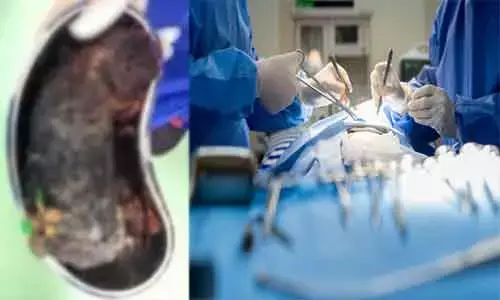- Home
- Medical news & Guidelines
- Anesthesiology
- Cardiology and CTVS
- Critical Care
- Dentistry
- Dermatology
- Diabetes and Endocrinology
- ENT
- Gastroenterology
- Medicine
- Nephrology
- Neurology
- Obstretics-Gynaecology
- Oncology
- Ophthalmology
- Orthopaedics
- Pediatrics-Neonatology
- Psychiatry
- Pulmonology
- Radiology
- Surgery
- Urology
- Laboratory Medicine
- Diet
- Nursing
- Paramedical
- Physiotherapy
- Health news
- Fact Check
- Bone Health Fact Check
- Brain Health Fact Check
- Cancer Related Fact Check
- Child Care Fact Check
- Dental and oral health fact check
- Diabetes and metabolic health fact check
- Diet and Nutrition Fact Check
- Eye and ENT Care Fact Check
- Fitness fact check
- Gut health fact check
- Heart health fact check
- Kidney health fact check
- Medical education fact check
- Men's health fact check
- Respiratory fact check
- Skin and hair care fact check
- Vaccine and Immunization fact check
- Women's health fact check
- AYUSH
- State News
- Andaman and Nicobar Islands
- Andhra Pradesh
- Arunachal Pradesh
- Assam
- Bihar
- Chandigarh
- Chattisgarh
- Dadra and Nagar Haveli
- Daman and Diu
- Delhi
- Goa
- Gujarat
- Haryana
- Himachal Pradesh
- Jammu & Kashmir
- Jharkhand
- Karnataka
- Kerala
- Ladakh
- Lakshadweep
- Madhya Pradesh
- Maharashtra
- Manipur
- Meghalaya
- Mizoram
- Nagaland
- Odisha
- Puducherry
- Punjab
- Rajasthan
- Sikkim
- Tamil Nadu
- Telangana
- Tripura
- Uttar Pradesh
- Uttrakhand
- West Bengal
- Medical Education
- Industry
Early Cholecystectomy for calculous cholecystitis safe, without intraoperative complications

A recent study addressing the optimal timing for Early Cholecystectomy (EC) in patients with acute calculous cholecystitis (ACC) has provided valuable insights into the management of this condition. The study, a multicentric prospective observational research effort, focused on patients with ACC who underwent cholecystectomy within ten days from the onset of symptoms.
The study was published in Healthcare journal by Paola Fugazzola and colleagues. The findings, based on data from 1,117 patients studied over a year, are encouraging and have significant implications for clinical practice. The patients were divided into three groups based on the timing of the cholecystectomy: those who underwent the procedure within 0–3 days, 4–7 days, and 8–10 days from the onset of symptoms.
The study’s primary objective was to determine whether the timing of EC affected various post-operative outcomes. The research did not identify any significant differences in post-operative complications, mortality, conversion rates, and the need for reintervention among the different timing groups.
However, the timing of EC did have a notable impact on intraoperative complications and the rate of subtotal cholecystectomies. Specifically, the study revealed that earlier EC (within 0–3 days) resulted in a lower risk of intraoperative complications (2.8%) compared to patients who had surgery between 4–7 days (5.6%) or 8–10 days (7.9%) after symptom onset.
Moreover, patients who received EC within the first three days had a lower rate of subtotal cholecystectomies (2.7%) than those in the 4–7 days group (5.6%) and the 8–10 days group (10.9%).
These results emphasize the importance of early intervention for ACC. The study suggests that as ACC progresses, the local and systemic inflammation intensifies, rendering surgery more complex and increasing the risk of intraoperative complications. Therefore, the recommendation stemming from this research is clear: performing EC for ACC as early as possible, ideally within the first ten days of symptom onset, can lead to better outcomes and reduced surgical complexities.
Reference:
Fugazzola, P., Abu-Zidan, F. M., Cobianchi, L., Dal Mas, F., Ceresoli, M., Coccolini, F., Frassini, S., Tomasoni, M., Catena, F., Ansaloni, L., & on behalf of the S.P.Ri.M.A.C.C. Collaborative Group. Timing of Early Cholecystectomy for acute calculous cholecystitis: A multicentric prospective observational study. Healthcare (Basel, Switzerland),2023;11(20):2752. https://doi.org/10.3390/healthcare11202752
Dr Riya Dave has completed dentistry from Gujarat University in 2022. She is a dentist and accomplished medical and scientific writer known for her commitment to bridging the gap between clinical expertise and accessible healthcare information. She has been actively involved in writing blogs related to health and wellness.
Dr Kamal Kant Kohli-MBBS, DTCD- a chest specialist with more than 30 years of practice and a flair for writing clinical articles, Dr Kamal Kant Kohli joined Medical Dialogues as a Chief Editor of Medical News. Besides writing articles, as an editor, he proofreads and verifies all the medical content published on Medical Dialogues including those coming from journals, studies,medical conferences,guidelines etc. Email: drkohli@medicaldialogues.in. Contact no. 011-43720751


